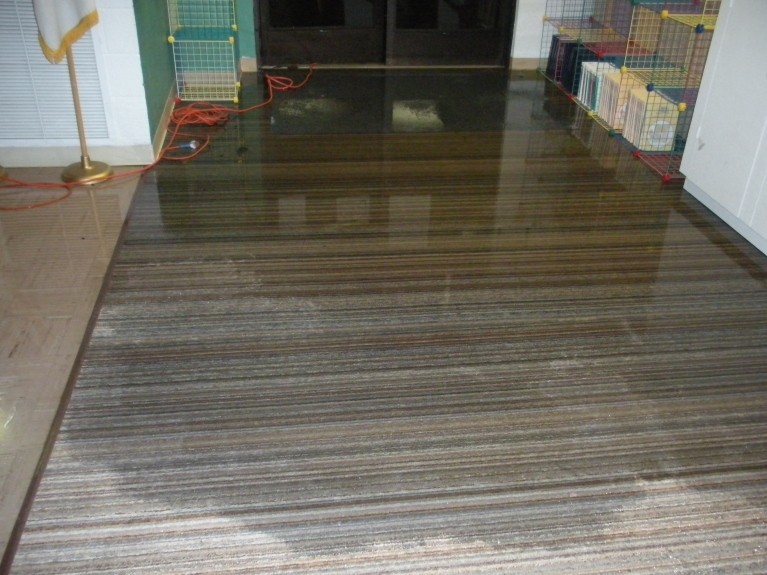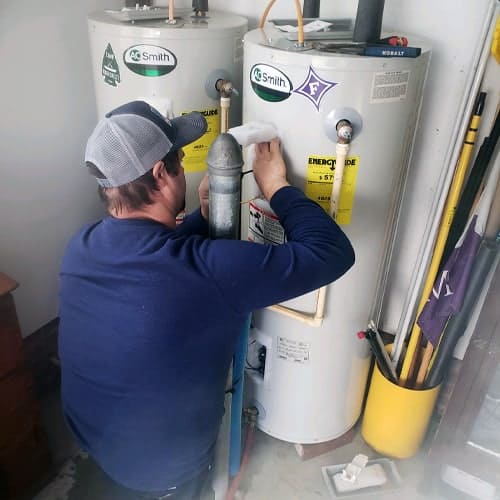Critical Actions for Homeowners Managing Broken Heating Units
Critical Actions for Homeowners Managing Broken Heating Units
Blog Article
We've stumbled on this post about Broken Water Heaters below on the net and believe it made good sense to write about it with you on this site.

Whether it is located in the basement or a separate area, damaged water heaters can cause stress. A conventional unit holds 80 gallons, so an over night leak will certainly result in a flooding. This causes major residential or commercial property damage with drenched walls and also floorings. Having no hot water supply is additionally problematic. If you are handling these problems, keep in mind of the following:
Call the Plumber
After doing the first two safety steps, you need to call your plumber to find right now to deal with a ruptured hot water heater. However, bear in mind that your system will not simply collapse drastically overnight. There are normally indications that your aging water heater has sediment build-up in the inside. Remember of the following:
Instead, as quickly as you spot these signs, have actually an expert come to examine your water heating unit tank. Typically, water heating units have a life-span of regarding 8 to 12 years.
Cut Off the Cold Water Supply
Cut off the storage tanks tap water supply from the source. This goes from your major water line into the container. When your storage tank remains in good condition, the cold water quits filling out when the storage tank is full. Given that it is dripping, the water will certainly continue to move. Close the shutoff located on top of the heating unit. Revolve this clockwise to shut it off. You must transform off that major water supply line outside your property if you can not discover it or reach it.
Shut Down Source Of Power
Prior to calling the plumber, closed off a gas water heater by turning the temperature dial. This will stop electrocution, particularly if there is a leakage as water is a conductor. Normally, the home heating element closes off when the water hits a specific temperature.
Clean Up Residential or commercial property
After calling the plumber, file damages by taking notes and pictures so you can claim your homeowner's insurance policy. From there, begin the instant cleaning. Take out any kind of essential possessions to stop more soaking. Eliminate any standing water to avoid mold and also mold development. Utilize that to drain the water if you have a completely submersible water pump. Or else, the standard bucket approach will certainly likewise function. Try to mop out everything, consisting of wall surfaces and baseboards. Maintain them running to maintain air flowing if you have an electric follower as well as dehumidifier. This will certainly help prevent mold and mildew growth.
Remember, if you discover any type of concerns with your water heater, call the pros immediately. You can not take this issue lightly because a defective thermostat can raise water temperature to a hazardously high level, resulting in unintended burns. A damaged heating system stress relief valve can additionally trigger a surge. For best results, get a yearly check so your device obtains evaluated, cleansed, drained, and also filled up, assuring optimal efficiency.
After doing the initial two safety and security actions, you need to call your plumber to come right away to deal with a ruptured water heating unit. Rather, as soon as you identify these indicators, have actually a professional come to evaluate your water heating unit tank. Before calling the plumber, closed off a gas water heater by transforming the temperature dial. If you have a completely submersible water pump, make use of that to drain pipes the water. Bear in mind, if you notice any issues with your water heater, call the pros right away.
Is My Water Heater Broken?
The Water Heater is Old
No appliance will last forever. This includes a home’s water heater. During its lifespan, residents are going to face a situation where a new water heater installation will be necessary. The biggest problem with this is that most people are not sure when their water heater expires. Not knowing this can lead to serious risks if the unit begins to act up due to old age.
Most makes and models of water heaters will last between eight and 10 years. While 10 years is the age when water heater replacement is highly recommended, the need to replace the unit may occur before this time or after. If the unit doesn’t show any symptoms of a problem, it is a good idea to replace it at the 10-year mark (from the manufacture date).
Some of the symptoms that indicate a new unit is needed include rusting, leaks, noises, and a failure to heat up the water. Also, note that not all units have a 10-year life expectancy. The main exception to this rule is that a gas unit will last for six to eight years.
Rusty Heater Inlet Valve or Water
While steel is the strongest material on earth, it does have a weakness – rust. If corrosion occurs on a steel surface, it will begin to spread and eat through the steel in certain areas. On water tanks and pipes that are made of steel, rust is a warning sign of an impending leak.
The issue for many is trying to figure out if the rust is coming from the water heater or the pipes that lead to the faucet. If rust is seen, it is a clear indication that water heater service from the professionals is needed.
If rusty water appears out of the faucets in the bathtub or sink, it likely means a rusty water heater. If there is rust near the water inlet or the pressure relief valve, rust has likely developed inside the tank. If tap water appears rusty, it may be an issue with the pipes.
Strange Sounds from the Water Heater
Are there strange sounds coming from the tank? As a water heater gets older, rumbling noises may develop and get louder and louder as the water in the tank heats up. In homes where large amounts of hot water are used, the issue is likely going to be even more obvious when more serious issues arise. If there is a strange or loud noise coming from the unit, it is probably because of sediment buildup. A good way to remedy this problem is by flushing the heater. If this does not work, then a new unit may need to be installed.
Leaks
As a water heater gets closer to the end of its useful life, there is a higher chance there will be water around the tank. If there is water, this usually means leaks are occurring. Based on where the unit is located in the home, a leak may result in serious property damage.
Leaks are usually caused by expansions in the metal tank. The expansions occur as time passes and as the inside body of the tank is exposed to multiple heating cycles per day. When a fracture forms, the gap will be slight enough to hold the water in; however, in more serious situations, this will not be the case. If the tank is idle, the water will not leak but when the metal expands during each heating system, small amounts of water will get through the gap.

As a fervent reader about Maintaining & Draining a Water Heater, I think sharing that chunk was worthwhile. Are you aware of anybody else who is fascinated by the subject? Why not share it. I praise you for your time. Don't forget to check up our blog back soon.
Quick service, just dial! Report this page